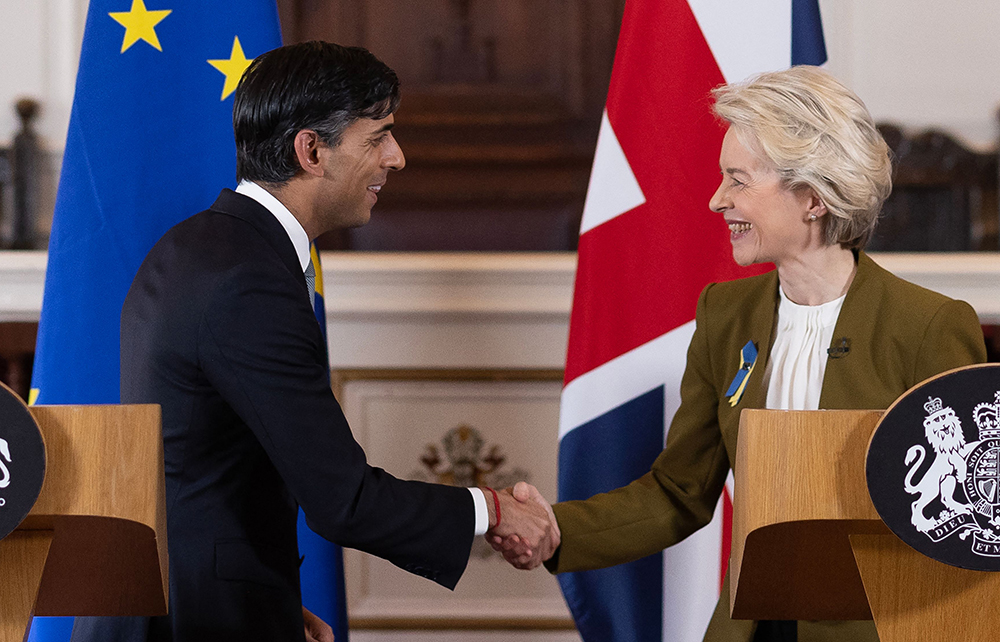The pound rose a cent or two against the dollar in response to the new trade deal for Northern Ireland. The FTSE 100 index rose on Monday but slid back on Tuesday, deterred by the prospect of a stronger pound, while the more domestic FTSE 250 showed a clearer uptrend. Overall, markets were cautiously positive about the Windsor Framework, not so much for its effect on movement of goods through Northern Irish ports as for its signal of calmer UK-EU trade relations ahead on a wider front.
And what really matters is whether this change of tone catalyses a new wave of inward investment. The recent claim by economist Jonathan Haskel that Brexit had cost us £29 billion in lost investment and productivity provoked outrage in some quarters. Yet there can’t be serious doubt that the UK has looked a dangerously uncertain destination for anyone’s capital these past seven years: our pent-up potential has been held back by angry stalemate around the Irish border. Time will tell – but if capital now flows in again as it did before 2016, Rishi Sunak has notched up a major achievement.
Lost tribe
I’m enjoying Blue Blood, a blow-by-blow account of the fate of Cazenove & Co: once the City’s most powerful stockbroking firm, now confusingly a brand name within both the JPMorgan Chase banking empire and the asset manager Schroders. The author, Robert Pickering, was Cazenove’s chief executive during its transition from posh partnership to half of a joint venture with JP Morgan. Signed in 2004, that tie-up brought strength and reach but irreconcilable tensions between Cazenove style – low-profile but hugely connected and as one grandee put it, ‘more like a group of friends who happen to work together’ – and thrusting Americans determined to wrest control from entitled Brits.
Blue Blood encapsulates the City’s evolution in modern times and is all the more noteworthy for the fact that Cazenove was one of the last big names to yield to the forces of globalised finance. If Pickering’s tone is defensive, it’s because he knows how many of his former colleagues regret the extinction of their City tribe. But it could have been worse. Firstly, the deals with JP Morgan (which bought out the joint venture in 2009) and Schroders (which bought Cazenove’s investment arm in 2013) yielded £2 billion, much of it divided between former partners and executives. Secondly, before JP Morgan closed in, Pickering almost sold the firm to Lehman Brothers, which self-destructed spectacularly in the 2008 crisis. If that sale had gone through, says Pickering, ‘I would have been burned in effigy ever after’ at annual lunches of Cazenove alumni.
Recharged
Britishvolt, the battery ‘gigafactory’ project in Northumberland that collapsed in January, lives to fight another day. An Australian company, Recharge Industries, has bought it out of administration, promising a combination of US technology, Australian minerals and British je ne sais quoi – represented by cricketer turned trade envoy Lord Botham. ‘Beefy is very supportive,’ says David Collard, boss of the US venture capital firm that stands behind Recharge.
The upside is that the revived venture will need neither Russian minerals nor Chinese know-how. The downsides are that Recharge has yet to complete its first plant in Australia – and that the UK needs several more such gigafactories if we’re to achieve self-sufficiency in batteries to match our capacity to build electric vehicles. Still, it all sounds better than an abandoned windswept Northumbrian building site.
No Deutsche BT
‘I want my money back,’ is an unusually frank sentiment for a corporate chief talking about what might have been his boldest strategic investment. But that’s what Tim Höttges of Deutsche Telekom has said about the 12 per cent holding in BT his company acquired from the 2016 sale to BT of the mobile operator EE, previously part-owned by Deutsche. Höttges himself joined the BT board and was widely believed to be plotting a takeover bid that might have created a multi-national telecoms giant. But BT went on to face years of criticism for mediocre financial performance and the snail’s pace of its 5G broadband upgrade: in consequence, its shares slumped by 80 per cent.
Combined with the pound’s weakness against the euro, that left Deutsche with a £4 billion loss on what was originally a £5.6 billion stake. So Höttges is hoping for an exit – possibly via a deal with the Israeli billionaire Patrick Drahi, who holds 18 per cent of BT – and we’ll never find out whether a Deutsche-owned BT would have been more efficient, progressive and customer-friendly than the stumbling native version.
Another temple gone
In a mood for City nostalgia, I’m wondering whether I’m alone in regretting the destruction of BT’s former HQ in Newgate Street – on the site of the Central Telegraph Office where Marconi made the first public wireless transmission. Opened in 1985, the BT Centre was a flagship of optimism for the newly privatised telecoms provider as a technology leader in an era of radically improved consumer choice. It was also my father’s last office (he was BT’s deputy chairman) and he loved its high-tech boardroom and high-speed executive lift.
Four decades on, stripped back to a concrete shell, it awaits rebirth, I read, as ‘London’s first net-zero-carbon-enabled office development’ complete with rooftop wildflower meadow. Perhaps there’s a metaphor for the ultimate fate of BT itself in there, just as the Cazenove story stands for another wave of City renewal. The cloud-capped towers and solemn temples dissolve, as the Bard said – but at least, in the world of business, something new and interesting usually rises from the ruins.







Comments